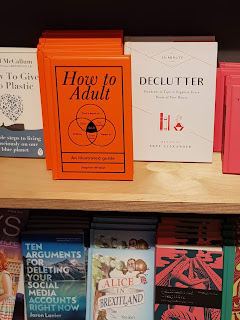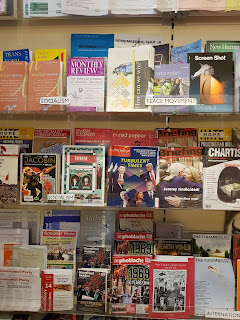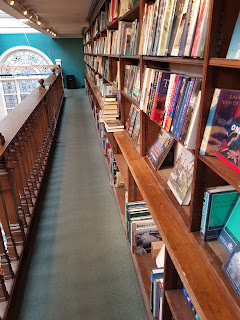Today I started with galleries on the South Bank in London before travelling North towards East Finchley.
42. If you wish to discuss books with a nicely-toned and well-modulated actor, I recommend you visit the National Theatre Bookshop, a short and well signposted walk from Waterloo Station. The NT looks like The University of East Anglia, only it is on the South Bank.
The NT is spacious inside. The bookshop isn't big enough to have many books but if you're looking for a play, or books on acting then this is a good place to look.
The bookshop started in the 1980s as a cart outside, which was shared with the Old Vic. The current building was used when National Theatre divorced from The Old Vic.
The books are good. They are chosen by the curator Richard. Unfortunately Richard's surname was withheld under GDPR and is only available via the NT press office. I can reveal, though, Richard does have a surname and probably a date of birth.
All the staff were were professional actors and very helpful. Perhaps they were only acting helpful. They acted helpful with great integrity.
43. The Tate Modern Bookshop is ten minutes walk away from the NT, turning right at the river and continuing just past Blackfriars Bridge. There are three bookshops at the Tate Modern. I didn't visit the visitor's bookshop because it was for tourists, which I'm not.
The main Tate Modern Bookshop is at the entrance. It is quite big, around five narrowboats in size and has a traditional layout. It supports those studying or interested in Art, so has a good selection of books on Art Theory, Art Technique and Art History. It also has very good books on social politics.
The curator of all three bookshops was Simon Armstrong, whose name I won't reveal for legal reasons.
44. The Tate Modern Bookshop number 2, is smaller and dedicated to art books for children and exhibition books. Tate Modern publishes some books for the exhibitions. Again, there are excellent books on society.
Staff in both bookshops were extremely helpful. I did ask, and none were paid actors.
45. Primrose Hill Books on Regent's Park Road is a few minutes walk from Chalk Farm tube station. It is a long and narrow local bookshop that has been around for 32 years, with a few secondhand books outside. The selection is limited but it has a good range of children's books. The bookshop is pleasant but not exceptional. Surprisingly, photos of books on shelves was strictly prohibited so I was unable to take the following picture:
Instead, you will need to imagine the above picture.
46. Owl Bookshop at 207 Kentish Town Road was another local bookshop. It is a short walk from Kentish Town station. This bookshop was three narrowboats in size, and the children's section occupied about a third of it. It has been running since the 1980s.
The shop had about four people when I entered. The shop assistant didn't know where the "Owl" came from in the shop's name.
47. Hellenic Bookshop on Fortess Green Road is close to Tufnell Park Tube. The area is quite run-down and in the midst of it is this bookshop, which is quite remarkable. The shop specialises in Latin, ancient and modern Greek language books, and books about Hellenic culture. It also has some travel books. It answers the question of where do you go if you want a textbook on Botanical Latin?
The bookshop isn't big, but it has a downstairs for reasonably priced secondhand books.
The shop provides texts to most schools teaching Latin and Greek. It has been running since 1966, when Latin was probably classified as a modern language.
The bookshop is comprehensive for current publications but the focus is more language than culture. It definitely worth a visit for anyone interested in classical texts though.
48. Black Gull Books on the High Road, East Finchley is a local secondhand bookshop, in theory. However the local people who supply the books happen to be families, therapists, philosophers and avid readers of fiction. Therefore it has become a local bookshop with children's books and fiction, and specialist books in therapy and philosophy and other areas too. Buying psychotherapy books selected by a local expert couldn't be easier.
Black Gull Books started out in Camden Lock before opening a second shop in East Finchley. The East Finchley bookshop is doing well but there are discussions to eventually re-nest the Camden Black Gull to the coast at Eastbourne.
42. If you wish to discuss books with a nicely-toned and well-modulated actor, I recommend you visit the National Theatre Bookshop, a short and well signposted walk from Waterloo Station. The NT looks like The University of East Anglia, only it is on the South Bank.
The bookshop started in the 1980s as a cart outside, which was shared with the Old Vic. The current building was used when National Theatre divorced from The Old Vic.
The books are good. They are chosen by the curator Richard. Unfortunately Richard's surname was withheld under GDPR and is only available via the NT press office. I can reveal, though, Richard does have a surname and probably a date of birth.
All the staff were were professional actors and very helpful. Perhaps they were only acting helpful. They acted helpful with great integrity.
43. The Tate Modern Bookshop is ten minutes walk away from the NT, turning right at the river and continuing just past Blackfriars Bridge. There are three bookshops at the Tate Modern. I didn't visit the visitor's bookshop because it was for tourists, which I'm not.
The main Tate Modern Bookshop is at the entrance. It is quite big, around five narrowboats in size and has a traditional layout. It supports those studying or interested in Art, so has a good selection of books on Art Theory, Art Technique and Art History. It also has very good books on social politics.
The curator of all three bookshops was Simon Armstrong, whose name I won't reveal for legal reasons.
44. The Tate Modern Bookshop number 2, is smaller and dedicated to art books for children and exhibition books. Tate Modern publishes some books for the exhibitions. Again, there are excellent books on society.
Staff in both bookshops were extremely helpful. I did ask, and none were paid actors.
45. Primrose Hill Books on Regent's Park Road is a few minutes walk from Chalk Farm tube station. It is a long and narrow local bookshop that has been around for 32 years, with a few secondhand books outside. The selection is limited but it has a good range of children's books. The bookshop is pleasant but not exceptional. Surprisingly, photos of books on shelves was strictly prohibited so I was unable to take the following picture:
Instead, you will need to imagine the above picture.
46. Owl Bookshop at 207 Kentish Town Road was another local bookshop. It is a short walk from Kentish Town station. This bookshop was three narrowboats in size, and the children's section occupied about a third of it. It has been running since the 1980s.
47. Hellenic Bookshop on Fortess Green Road is close to Tufnell Park Tube. The area is quite run-down and in the midst of it is this bookshop, which is quite remarkable. The shop specialises in Latin, ancient and modern Greek language books, and books about Hellenic culture. It also has some travel books. It answers the question of where do you go if you want a textbook on Botanical Latin?
The bookshop isn't big, but it has a downstairs for reasonably priced secondhand books.
The shop provides texts to most schools teaching Latin and Greek. It has been running since 1966, when Latin was probably classified as a modern language.
The bookshop is comprehensive for current publications but the focus is more language than culture. It definitely worth a visit for anyone interested in classical texts though.
48. Black Gull Books on the High Road, East Finchley is a local secondhand bookshop, in theory. However the local people who supply the books happen to be families, therapists, philosophers and avid readers of fiction. Therefore it has become a local bookshop with children's books and fiction, and specialist books in therapy and philosophy and other areas too. Buying psychotherapy books selected by a local expert couldn't be easier.






















































